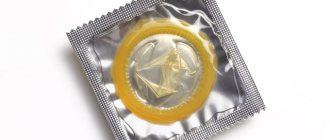Types of birth control pills and mechanism of action
Based on their composition, birth control pills are divided into two groups:
- estrogen-gestagen, or combined oral contraceptives (COCs). These include most drugs, for example, Jess, Yarina, Regulon, Novinet;
- pure gestagens are Charozetta, Laktinet and Modell Mam.
The mechanism of action of the two groups is the same. Due to gestagens, the synthesis of the pituitary hormones FSH and LH is blocked, which normally contribute to the maturation of the egg and ovulation. An additional contraceptive effect is provided by thickening the cervical mucus, reducing peristalsis of the fallopian tubes and reducing the thickness of the endometrium. Therefore, if ovulation occurs and conception occurs as a result of unprotected sex, the embryo will not be able to implant into the wall of the uterus.
But COCs contain an estrogenic component. It does not have a contraceptive effect and is necessary to maintain ovarian function and control the menstrual cycle. But it is ethinyl estradiol that is associated with the majority of side effects and contraindications.
Attention! Taking birth control for the first time without a doctor's prescription is dangerous. Only after examination by a gynecologist can you choose the appropriate remedy.
Periods when canceled OK
As practice shows, for many women, after stopping hormonal contraception, the chance of becoming pregnant significantly increases. It's called the rebound effect. This is due to the fact that after stopping the OC, the ovaries begin to work in a more active mode than before. Therefore, as a “prevention”, such hormonal drugs are prescribed to women who want to become pregnant.
But in certain cases the opposite phenomenon is observed. This is ovarian hyperinhibition. The reproductive system is in a disordered state, which is why both ovulation and menstruation are absent. This condition, of course, does not last a lifetime. Within three months it resolves on its own.
But we must not forget that in a considerable number of women, both the menstrual cycle and reproductive function are not restored immediately, but over the course of a year after the abolition of contraceptives.
What determines the duration of the recovery period? Several factors are at play here:
Rules for taking birth control pills
Before you start taking hormonal birth control pills, you should visit a gynecologist to make sure there are no contraindications. The examination consists of a gynecological examination, taking a smear for oncocytology, and studying the medical history. Blood clotting tests and biochemical studies will also be required.
The doctor selects the drug, taking into account concomitant gynecological pathologies. It is necessary to specifically select a product in the following conditions:
- nulliparous girls;
- with endometriosis;
- polycystic and functional ovarian cysts;
- somatic pathologies;
- for problems with the thyroid gland, diabetes;
- in the postpartum period.
It is not recommended to independently replace a drug prescribed by a doctor. This will lead to side effects.
On what day can you start a course of birth control?
The best day to start taking birth control pills is the first day of your period.
At this time, hormones are at a minimum level, and there is confidence in the absence of pregnancy. Drink one tablet from the pack daily, moving along the arrow. If you follow the rules of administration, you do not need to take additional protection in the first cycle. The contraceptive effect develops within 7 days, so ovulation has time to slow down. It is allowed to start taking birth control pills on the 3-5th day of your period . But with this scheme, during the first half of the cycle you need to protect yourself with a condom. Without waiting for your period to start, you can start taking birth control pills in the following cases:
- after an abortion;
- after curettage of the uterine cavity;
- with spontaneous miscarriage in a short term.
In this case, the pills are necessary not only as a means of contraception, but also to restore the menstrual cycle.
Taking birth control pills before your period starts is not recommended. This regimen can be prescribed by a doctor for dysfunctional bleeding and other gynecological pathologies and irregular cycles.
Do I need to strictly adhere to the appointment time?
It is recommended to take hormonal pills at any time of the day, but adhere to an interval of 24 hours. This is the period during which the components of the drug are metabolized in the body and gradually its concentration in the blood begins to decrease. If a slight time shift occurs, this will not reduce the effectiveness of the drug, but it is better not to allow deviations of more than an hour.
The best time to take birth control pills is considered to be 8-9 a.m., regardless of meals. The medicine is well absorbed on a full stomach or on an empty stomach. It is not contraindicated to take pills in the evening, but the morning hours are considered more suitable due to the natural daily increase in hormones.
Should I take a break from taking birth control pills?
Previously, it was believed that taking hormonal contraceptives for a long time was harmful to the body. They were considered the culprits of ovarian hyperinhibition syndrome. But such side effects were typical for large doses of hormones; in modern drugs they are minimal. Sometimes, after finishing treatment, women do not have periods, but this condition often occurs in patients with pathology of the menstrual cycle, which was present before the start of the COC course.
Birth control pills are taken without interruption for several years, until the woman plans a pregnancy (read more here). If you suddenly stop taking it, on the contrary, the likelihood of unplanned conception increases. This is due to the rebound effect: after a long rest, the ovaries begin to function especially strongly, often several eggs mature.
What to do if you miss a pill?
They take birth control pills every day, and you can’t skip pills. If the time for taking it is missed, you need to focus on the number of the tablet in the pack and the period that has passed since the last pill you drank. Skipping up to 12 hours is relatively harmless. A woman needs to drink the drug as soon as possible, and take the next dose at the usual time.
If 24 hours have passed since the forgotten contraceptive pill, proceed as follows:
- tablet number up to 7 - take 2 doses at once, and the next one at the usual time, use a condom until the end of the cycle, pre-ejaculatory withdrawal of the penis is ineffective;
- tablets numbered 8-14 - take 2 tablets at once, and at normal times - 1, additional contraception is not needed;
- from 15 to 21 tablets - take the forgotten one and continue using the COC as usual.
If there are 28 contraceptive pills in a package, then the last 7 tablets, colored in a different color, are pacifiers . If you skip them, you don’t have to worry about your health and, after a forgotten dose, switch to a new pack. But you can’t start taking new birth control pills in the middle of your cycle.
How to properly stop using oral contraceptives?
Women who start taking birth control pills from the group of combined oral contraceptives after their period are advised to wait until the end of the package, even if it is one month of use. Exceptions include severe complications and side effects that result from the use of the drug.
Those to whom the doctor has prescribed progestin contraceptives can stop taking the pills on any day of the cycle without harm to health. This will allow the menstrual cycle to resume normally and avoid complications of use.
When is it permissible to quit a started pack of birth control pills?
Contraceptives can be produced in various combinations of estrogens and gestagens:
- monophasic - in them the concentration of hormones is the same in all tablets;
- biphasic - in a monthly package, the concentration of hormones changes in the second phase, but currently these drugs are not used;
- three-phase - in a package of 3 types of tablets with different doses, often used in women approaching menopause.
Monophasic contraceptives have less effect on the cycle than others. You can stop taking birth control pills halfway through the pack. But three-phase tablets are taken to the end, with the exception of allergic reactions and severe side effects.
How to move the day of menstruation?
Oral contraceptives allow you to influence the day your period starts. Some resort to them in order to delay its onset. This can be done in several ways:
- To start taking hormonal pills, choose the 5th day of your period, so the next menstruation will begin a week later;
- after finishing a pack of 21 tablets, do not take a break for 7 days, but immediately start a new pack.
The latter method will shift menstruation to a full cycle, after which a week-long break is taken. But frequently using such methods to correct menstruation can result in hormonal imbalance.
Intermenstrual discharge with OK
You can often find similar messages on women’s forums: “I’m taking birth control pills and my period started—what is this?”
If we look at medical statistics, 30% of women experience intermenstrual bleeding within 3 months after switching to hormonal contraception. Sometimes this period lasts up to six months. According to the same statistics, this most likely occurs when taking low-dose contraceptive medications (containing no more than 20 mcg of estrogen). Often this dosage is not enough to establish a stable menstrual cycle.
That is, in this case, the endometrium begins to be shed earlier than expected. As a result, the woman Fr. But this phenomenon does not indicate a decrease in the effectiveness of prescribed drugs. That is, pregnancy does not occur when such a symptom occurs.
If such bleeding continues, there is no need to cancel hormonal contraceptives. You just need to pay more attention to personal hygiene issues. If the bleeding does not stop 3 months after the prescription of OK, you should think about changing the drug. Intense discharge should be especially alarming. But it is better not to “self-prescribe” a new drug. The right way out of the situation is to contact your gynecologist.
If intermenstrual bleeding begins when you start taking a new pack of OCs, this indicates that the estrogen contained in the tablets is not enough. You need a product with a higher concentration of this hormone.
But if bleeding is observed, on the contrary, towards the end of the package of tablets, this indicates an insufficient content of the gestagen element in the product. It may be necessary to choose an OC with a different type of this hormone.
How to combine birth control with antibiotics
In order to take birth control pills correctly, it is necessary to take into account their compatibility with other medications, including antibiotics. Some antibacterial drugs may reduce the concentration of ethinyl estradiol in the blood. Lack of estrogen will not lead to a decrease in the contraceptive effect, but can lead to breakthrough bleeding and disruption of the menstrual cycle.
It is not recommended to combine contraceptives with antibiotics from the tetracycline and penicillin groups. Clarithromycin and Erythromycin can, on the contrary, increase plasma concentrations of hormones. Therefore, women who need treatment for vaginal inflammation should give preference to drugs in the form of suppositories. In other cases, if possible, the doctor should prescribe alternative antibiotics to avoid drug interactions.
What reduces the effectiveness of COCs
Hormonal drugs undergo several stages of hepatic metabolism. Therefore, they may be affected by medications that stimulate or inhibit liver enzymes. The effectiveness of COCs is reduced when used simultaneously:
- tinctures, decoction of St. John's wort;
- barbiturates;
- azole antifungals;
- protease inhibitors used to treat HIV;
- grapefruit juice.
Alcohol in small quantities does not significantly affect the metabolism of hormonal contraceptives, but with alcohol abuse, adverse reactions increase.
Smoking is not recommended for women using COCs. It affects blood clotting and promotes the development of thrombotic complications. After 35 years, COCs with estrogens are not suitable for smokers, but taking gestagenic contraceptive drugs is allowed (for more details, see which COCs to take after 35).
The effectiveness of contraception decreases with indigestion. If you vomit within 2-3 hours after taking the tablet, you need to repeat the dose. Diarrhea also accelerates peristalsis and removes unabsorbed drug.
When does the effect occur?
If the drug is started on the first day of your period, the remedy will work immediately. It does not matter which type of pill (micro or mini) a woman chooses. Taking between days 2-5 of the period does not guarantee a contraceptive effect. The medication will not take effect; you will need to take additional protection for a week. After this period the protection is more reliable.
Girls often suffer from menstrual pain or heavy bleeding; regular use of a hormonal drug reduces these complaints. Dysmenorrhea caused by spasmodic pelvic pain during bleeding is relieved after taking the drug for a week.
The medications work to suppress the body's natural cyclical hormones, preventing pregnancy. Changes in the uterine mucosa occur after 10 continuous doses, preventing the fertilized egg from implanting.
Precautionary measures
Having correctly chosen the day of the menstrual cycle for the first dose of OK, you may encounter the appearance of spotting bleeding on the 14th-15th day. A small amount of blood is released, which indicates addiction to the drug. Sometimes bleeding occurs in unexamined women with endometrial hyperplasia or polyps. To avoid this, you need to visit a gynecologist before purchasing the medicine.
A delay in menstruation while taking contraceptives does not always indicate pregnancy; sometimes it is a consequence of an incorrectly selected dosage. Therefore, stop taking the pills until the reasons are established.
Some women worry that hormones are disrupting their metabolism. It is possible to gain weight while using modern contraceptives, but this is a rare side effect. If your weight starts to increase, you need to change your contraceptive.
COCs are sometimes used as emergency contraception, where a large dose of pills is taken at short intervals. This method can be used if there are no other contraceptives at hand, but it will not help cause a miscarriage; pregnancy cannot be frozen with this treatment.
Advice from gynecologists
To take hormonal pills correctly, you need to follow the instructions for the prescribed drug. Then the effectiveness of contraception will be maximum. But a consultation with a gynecologist is necessary if there is a severe reaction to the drug. It is not always associated with contraindications to taking COCs, but may be the result of an incorrectly selected medication. To improve the condition, a change in drug is required. Undesirable reactions such as spotting in the middle of the cycle, breast tenderness are an indicator of addiction to the drug during the first 2 months, and later require replacement of the COC.











